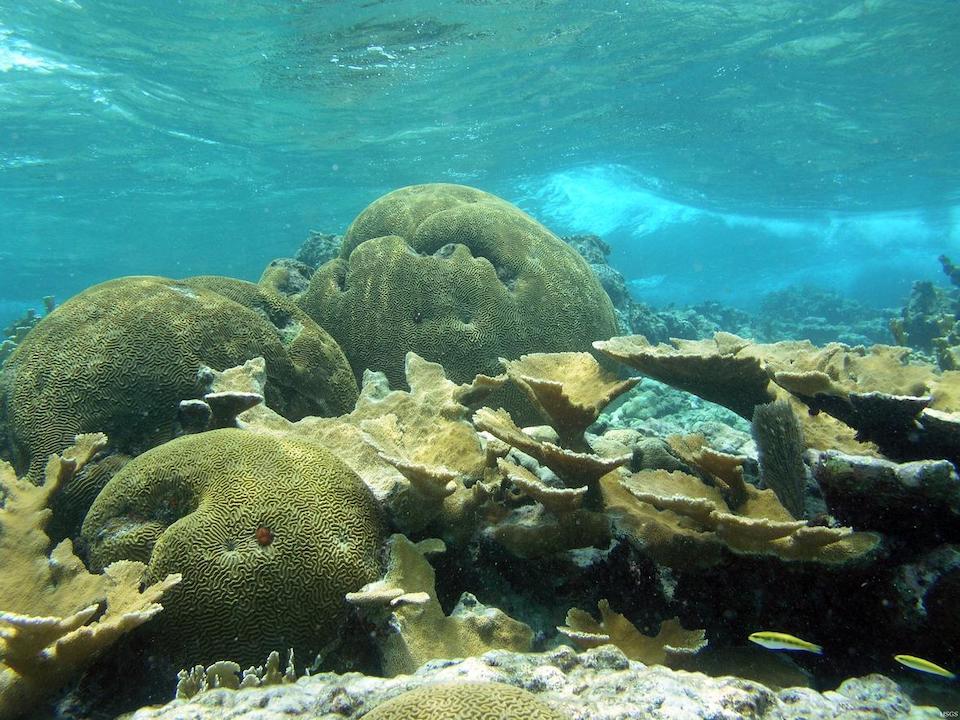
U.S. Virgin Islands officials are instituting a ban against sunscreens that contain chemicals harmful to coral reefs/USGS
Concerns over the harm many of today's sunscreens can have on coral reefs have prompted the U.S. Virgin Islands government to ban the importation, sale, and possession of any sunscreen product that contains the active ingredients of oxybenzone, octinoxate, or octocrylene. The ban could help the reefs that surround Virgin Islands National Park, Buck Island Reef, and other National Park System reefs there.
The full ban takes effect March 30, 2020, with retailers prohibited from importing shipments of sunscreen containing these ingredients after September 30, 2019.
In contrast to Hawaii’s “oxybenzone/octinoxate” ban, the Virgin Islands’ ban would begin more than a full year before Hawaii’s ban goes into effect. Additionally, the Virgin Islands’ ban on octocrylene means that only the mineral sunscreen products containing zinc oxide and titanium dioxide can be used in the islands. This makes the U.S. Virgin Islands the first jurisdiction that is compliant with the U.S. Food & Drug Administration’s recognition that only these two mineral ingredients are considered safe and effective over-the-counter sunscreen drugs.
Sunscreen pollution is a symptom of unsustainable tourism. In a single day, hundreds to thousands of beachgoers slathered in sunscreen hit the water, and most of it washes off, polluting that water. Some of the chemicals in sunscreens, such as oxybenzone, can be poisonous to ecosystems such as corals reefs and even those of lakes and rivers. One way of managing this pollution is to restrict sunscreens that contain these chemicals.
In response, businesses within the tourism industry proactively engaged the U.S. Virgin Islands legislature to mitigate sunscreen pollution impacts to coral reef conservation and restoration. Harith Wickrema, president of Island Green Living Association said, “The Caribbean has already lost more than 80 percent of its coral reefs due to a variety of issues. Studies have shown that these sunscreen chemicals are more than 40 times the acceptable levels in some of our bays. Tourism-based economies will experience financial devastation if coral reefs and other marine life cannot recover. The ripple effect would be huge and we need to take action now.”
At Virgin Islands National Park, staff ask that you avoid sunscreens with oxybenzone, butylparaben, octinoxate and 4-methylbenzylidine camphor, "all of which have been shown to cause coral bleaching even at low levels."
President William Clinton endorsed the ban on oxybenzone, octinoxate, and octocrylene during the Clinton Global Initiative Post-Disaster Recovery event in St. Thomas. While holding a tube of mineral sunscreen, Clinton stated: ‘If you are anywhere near an ocean or coral reef, it matters. I’m very proud of the National Park Service for selling this sunscreen. All of you should do what you can to encourage people to provide it.”
Some in the sunscreen industry disagree, indicating a lack of consensus within the industry. In a letter to the U.S. Virgin Islands legislature, Carlos Gutierrez of the Consumer Healthcare Products Association stated that, “Oxybenzone is a safe and effective ingredient approved by the FDA in 1966 and found in thousands of personal care products on the market today, including some of the most popular sunscreens, lip balms, shampoos, make-up, aftershave and other lotions designed to guard against sun damage.”
Joe DiNardo, a retired cosmetic industry executive and formulator, criticized Gutierrez’s statement in that, “The FDA no longer agrees with industry that these petroleum chemicals are safe. They’ve removed oxybenzone, octinoxate and octocrylene from being categorized as Generally Recognized as Safe and Effective. The current scientific literature is contrary to the industry propaganda that these chemicals are safe. For example, oxybenzone is linked to human birth defects.”
Dr. Craig Downs, one of the leading scientists studying the problem of sunscreen pollution, said about the new law, “The battle is between overtourism and ecological conservation – too many people are coming to enjoy the reef and their numbers are destroying it. The Virgin Islands government did one of the few things they could do to manage this impact, and that is encourage the use of environmentally safer sunscreens. Clean water is critical for allowing the next generation of coral reefs to become established in popular swimming areas.”
Prof. John Fauth of the University of Central Florida, another scientist who is studying this problem, points out the bigger picture of sunscreen pollution and coral reefs.
“Petroleum-sunscreen chemicals exacerbate the impacts of increased ocean temperatures and sunlight - two factors associated with climate change. Oxybenzone and these other chemicals can make corals more susceptible to bleaching and disease – reducing their resiliency to climate change events," he said. "The tourism industry understands that managing sunscreen pollution also means managing climate-change impacts.”


 Support Essential Coverage of Essential Places
Support Essential Coverage of Essential Places







Comments
I am an avid sunscreen user, and tend to buy based on cost, but those screens typically contain the chemicals in question. I am also a big advocate for protecting our reefs (and Flora and fauna in general). Now that I know that these products are dangerous I will no longer use them and find eco-friendly products. Thank you for bringing this to attention! I love the Caribbean and will do my part to protect and preserve it ! ?